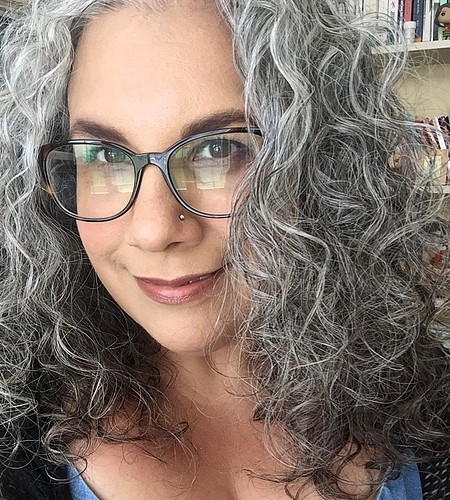Associate Professor of English

Phone: 269.337.7115
Office: Humphrey House, room 108
Email: Shanna.Salinas@kzoo.edu
PhD University of California, Santa Barbara
MA University of California, Santa Barbara
BA University of California, Los Angeles
About Shanna
Book that changed your life?
Sandra Cisneros’s The House in Mango Street. While there have been innumerable books that have had a great impact on me, both professionally and personally, none as much as this one. I first read it as an undergrad and it spoke to me in a way that no book had previously or ever has again. Everything about that book struck me as magical. It still does, actually. It is the book I return to every year. I still get goosebumps when I get to the ending vignette. Never fails. It’s the book that convinced me I couldn’t do anything other than be a Chicana/o literary scholar, simply because I knew I had to write about it. I’ve written about it three times now: as an undergraduate, in my honors thesis; as a graduate student, in my dissertation; and, now, as a published essay in a forthcoming collection.
What made you decide to become an English major?
I didn’t so much choose as give in to the inevitable. Whenever I talk to advisees about how I chose my major, I simply say, “English just made sense. It felt like home.” I always loved literature. I’d look at the course catalog and want to take every literature course offered. Initially I tried to talk myself into different majors, the so-called more “practical” ones; however, I soon found that, while I liked other disciplines and did well in my courses, nothing excited me or clicked in my brain the way my lit courses did. Ultimately, I decided to stop resisting what I enjoyed and declared my American Literature and Culture major. The best thing I ever did was let go of the idea that my major would decide my future. (As it turns out, my major did eventually help decide my future.)
How did you end up a college prof?
Countless years of school, supportive academic mentors and peers, a steadfast belief in my dissertation project, sheer relentless determination, the ability to take constructive criticism, a willingness to evolve as a scholar and educator, and a lot of luck during a semi-decent job market year.
Bio:
Shanna Salinas is an Associate Professor in the English Department and also serves as the Co-Director of Critical Ethnic Studies and the Co-Director of the Mellon Foundation Humanities for All Times grant initiative, Humanities Integrated Locational Learning (HILL). She teaches 19th, 20th, and 21st century U.S. literary and cultural studies, with an emphasis on U.S. race and ethnicity and a primary specialization in Chicana/o/x literature.
PUBLICATIONS:
“because we need to hurt in public: Embodying the Spectacle of Hurricane Katrina’s Black Suffering in Patricia Smith’s Blood Dazzler,” Voices and Visions: Essays New Orleans’s Literary History, ed. Nancy Dixon and Leslie Petty, University of Mississippi Press, January 2025.
‘“you were telling cochinadas’: Performative Metaphors for Storytelling in Sandra Cisneros’s Caramelo,” ‘¡Ay Tú!’: Critical Essays on the Life and Work of Sandra Cisneros, ed. Sonia Saldívar-Hull and Geneva R. Gano, University of Texas Press, October 2024
“For the Pleasure of the Latinx Poet: Spatialized Embodied Poetics in Ana Castillo’s My Father Was a Toltec,” Transnational Chicanx Perspectives on Ana Castillo, ed. Karen Roybal and Bernadine Hernández, Pittsburgh University Press, 2021.
“Coloring the U.S.-Mexico Border: Geographical Othering and Postbellum Nation Building in Kate Chopin’s The Awakening. Studies in American Fiction, vol. 41, no. 1, Spring 2018, pp. 39-60.
“Raced Bodies, Corporeal Texts: Narratives of Home and Self in Sandra Cisneros’ The House on Mango Street,” Critical Insights: Virginia Woolf and 20thCentury Women Writers, ed. Kathryn Stelmach Artuso, Salem Press, 2015.
WORK IN PROGRESS:
“‘we are all of paper’: Re-Writing the Textual Body in Salvador Plascencia’s The People of Paper.”
“‘¡No Más!’: Recovering Chicana Agency within Narratives of Historical Trauma in John Rechy’s The Miraculous Day of Amalia Gómez”
“HyperContextual Links: Mapping Interconnected Narratives of Spatiotemporal Coloniality in Karen Tei Yamashita’s Tropic of Orange”
Courses Taught:
- ENGL 109: Introduction to Literary Theory and Research Methods
- ENGL 155: Reading the World: Identities, “Rac(e)ing the Border: The U.S.-Mexico Border within the National Imaginary”
- ENGL 156: Reading the World: Social Justice, “Chicanx Social Activism”
- ENGL 230: U.S. Ethnic Literature
- ENGL 245: Electronic, Hypertext, and Multimedia Literature
- ENGL 276: Modernism and Postmodernism: U.S. Literature, 1914-Present
- ENGL 323: Chicanx Literature
- ENGL 490: Advanced Literary Study: NOLA Divided: Race in the Big Easy”

